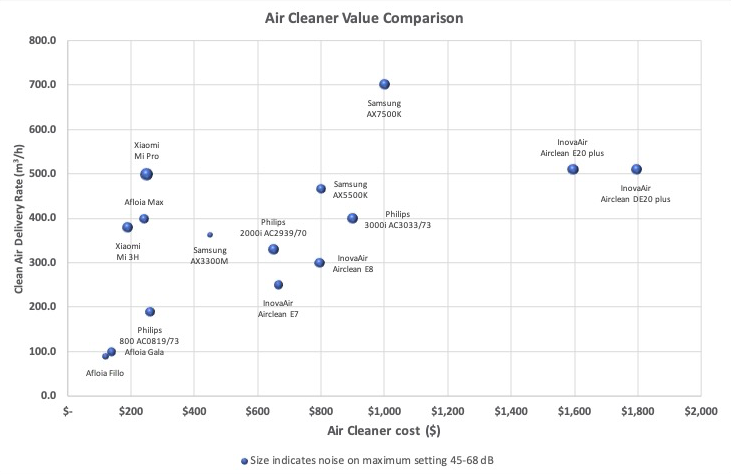As we head toward large numbers of cases and people look for ways to reduce their risks, I thought it might be worth mentioning one tool that some people might consider to reduce risk of transmission in homes (or offices), and that is, air purifiers. There is compelling data about the use of HEPA filters in reducing risk of transmission in enclosed spaces. There is enough evidence that the Victorian government planned to place them in as many schools as possible. Though it seems they forgot to consider supply issues.
So if you have visitors, or even if family members test positive, and you aren’t able to always ventilate your house, but want to add an extra layer of protection, air purifiers are a valid tool to reduce transmission. They have been shown in several real world instances to reduce transmission. One of those was recently in a local nursing home, where addition of portable air purifiers in rooms and hallways stopped what was an ongoing daily transmission of cases. Another was a study done on COVID particles in ICU wards. Though in this case, they found airborne particles were low, and concluded that may have been because patients in ICU were likely in a later stage of infection and may be less infectious than in general wards, in earlier stages.
So if you have the budget, and want to buy an air purifier, what properties make for a good one? Firstly, avoid any that use ozone, as it may cause more harm than good, and while sub light may kill bacteria and some other pathogens, it isn’t going to kill most viruses, so that won’t be important. What matters is mainly the quality of the HEPA filter, and the volume turnover of the unit. Also, carbon pellets tend to filter air better than carbon impregnated foam sheets. Carbon layers are often used to reduce smoke particles and pet odours etc.
The University of Melbourne reviewed a range of locally available air purifiers, and put up a chart mapping the main criteria, Clean Air Delivery Rate against price.
There are more than just the models they reviewed available, but it’s worth noting that according to their criteria, one of the better units available is the Xiaomi Mi Air Puifier Pro, which you can buy from several online stores from under $400. If you wanted something you can pick up in a store the same day, you’d probably have to consider other brands.
I just thought I’d throw this idea out there as one that some people may consider.
The full article from University of Melbourne is here:
